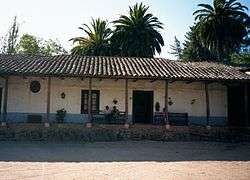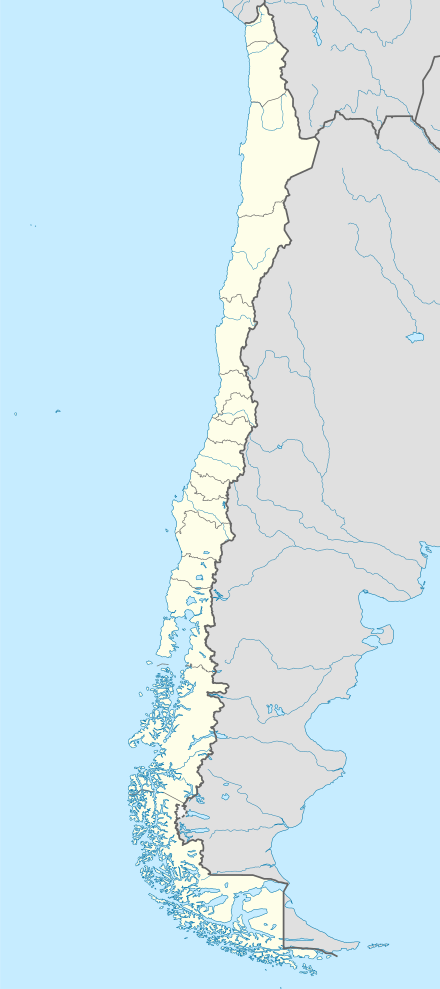Marchigüe
Marchigüe (Spanish pronunciation: [maɾˈtʃiɣwe]), sometimes spelled Marchihue ([maɾˈtʃiwe]), is a Chilean town and commune in the Cardenal Caro Province of Chile's sixth region of O'Higgins.
Marchigüe Marchihue | |
|---|---|
 Old house (casona) in Marchigüe. | |
 Coat of arms  Map of Marchigüe commune in O'Higgins Region  Marchigüe Location in Chile | |
| Coordinates (city): 34°23′49″S 71°37′10″W | |
| Country | |
| Region | |
| Province | |
| Government | |
| • Type | Municipality |
| • Alcalde | Héctor Hernán Flores Peñaloza |
| Area | |
| • Total | 659.9 km2 (254.8 sq mi) |
| Elevation | 124 m (407 ft) |
| Population (2012 Census)[2] | |
| • Total | 6,855 |
| • Density | 10/km2 (27/sq mi) |
| • Urban | 2,208 |
| • Rural | 4,696 |
| Sex | |
| • Men | 3,549 |
| • Women | 3,355 |
| Time zone | UTC-4 (CLT [3]) |
| • Summer (DST) | UTC-3 (CLST [4]) |
| Area code(s) | (+56) 72 |
| Website | Municipality of Marchigüe |
Demographics
According to the 2002 census of the National Statistics Institute, Marchigüe spans an area of 659.9 km2 (255 sq mi) and has 6,904 inhabitants (3,549 men and 3,355 women). Of these, 2,208 (32%) lived in urban areas and 4,696 (68%) in rural areas. The population grew by 11.2% (695 persons) between the 1992 and 2002 censuses.[2]
Administration

As a commune, Marchigüe is a third-level administrative division of Chile administered by a municipal council, headed by an alcalde who is directly elected every four years. The 2008-2012 alcalde is Héctor Hernán Flores Peñaloza.[1]
Within the electoral divisions of Chile, Marchigüe is represented in the Chamber of Deputies by Mr. Ramón Barros (UDI) and Mr. Juan Carlos Latorre (PDC) as part of the 35th electoral district, (together with Placilla, Nancagua, Chépica, Santa Cruz, Lolol, Pumanque, Palmilla, Peralillo, Navidad, Litueche, La Estrella, Pichilemu and Paredones). The commune is represented in the Senate by Alejandro García Huidobro (UDI) and Juan Pablo Letelier Morel (PS) as part of the 9th senatorial constituency (O'Higgins Region).
References
- "Municipality of Marchigüe" (in Spanish). Retrieved 5 September 2010.
- "National Statistics Institute" (in Spanish). Retrieved 13 December 2010.
- "Chile Time". WorldTimeZones.org. Archived from the original on 2007-09-11. Retrieved 2010-07-28.
- "Chile Summer Time". WorldTimeZones.org. Archived from the original on 2007-09-11. Retrieved 2010-07-28.
| Wikimedia Commons has media related to Marchigüe. |
External links
- (in Spanish) Municipality of Marchigüe
